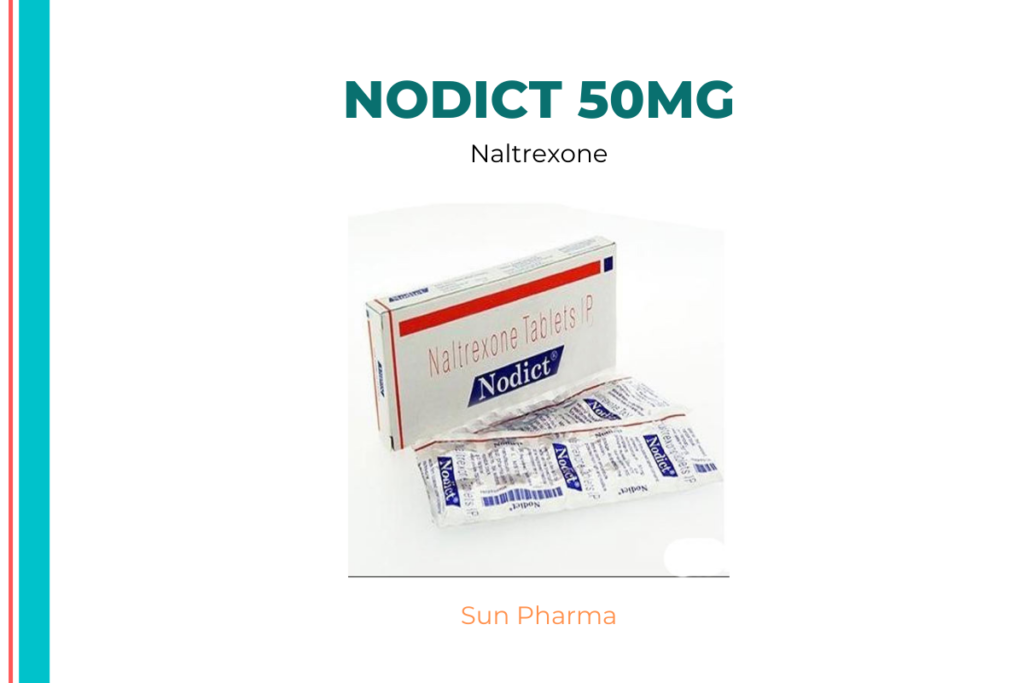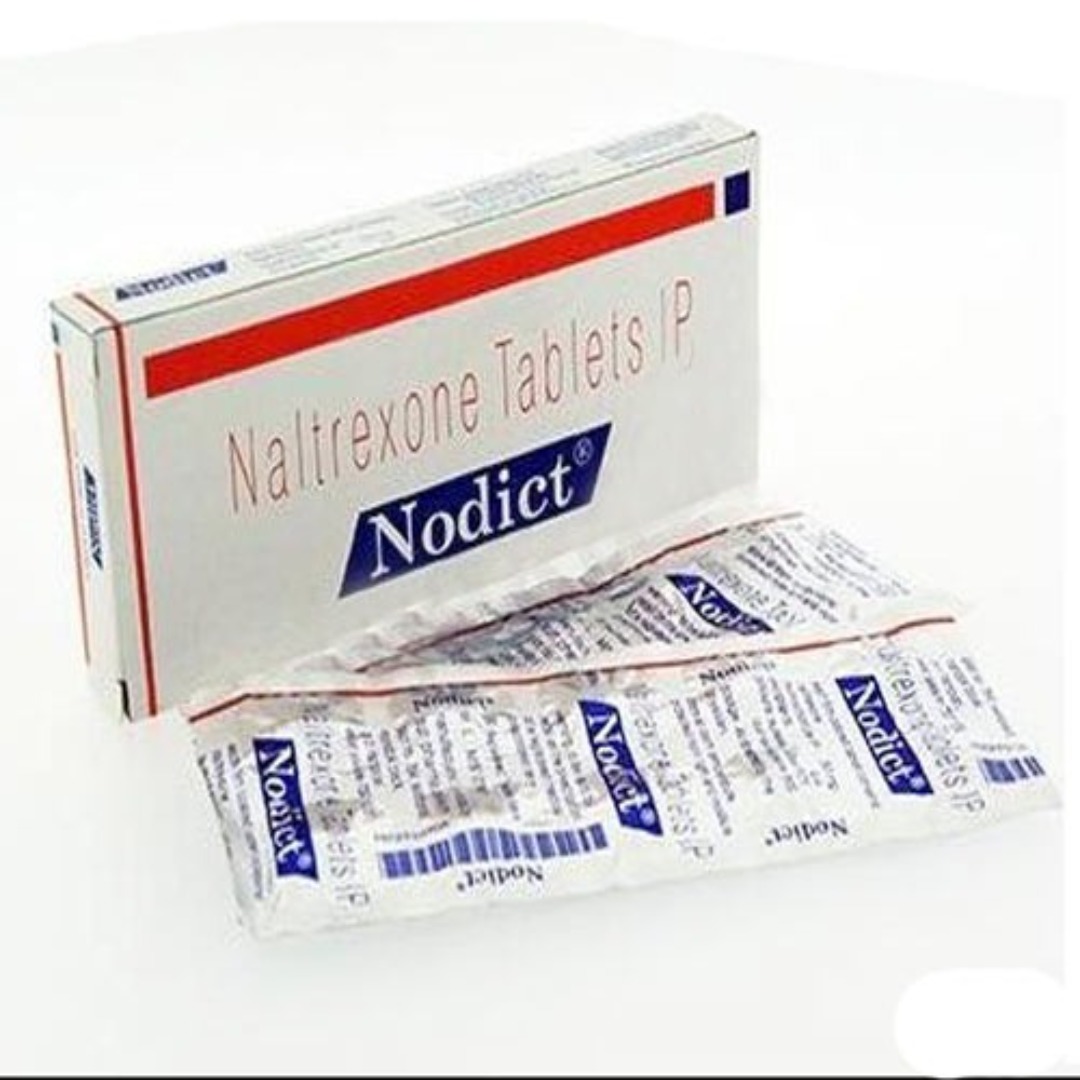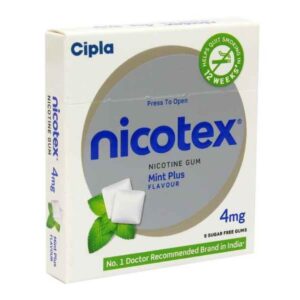Nodict 50 mg
Nodict 50 mg belongs to the ‘opioid-antagonist’ class of drugs used to treat alcoholism (chronic alcoholism) and opioid addiction. Alcoholism is a chronic medical illness marked by a present or previous history of binge drinking, a strong desire for alcohol, ongoing usage despite previous drinking difficulties, and an inability to control alcohol consumption. Opioid dependence is a condition in which a person’s body becomes physically reliant on a substance in order to avoid withdrawal. Instead of producing enough opioids on its own, the body has begun to rely on opioids from outside sources to sustain normal function.
‘Naltrexone’ is present in Nodict 50 mg. It works by inhibiting the effects of opioid receptors, reducing cravings and drives to use alcohol or opioids. However, it is used in conjunction with counseling and social support to help people who are addicted to alcohol stop drinking.
For optimal effects, take Nodict 50 mg as directed by your doctor, with or without food to avoid stomach disturbance, and at regular intervals every day. Joint discomfort, muscular soreness, insomnia (difficulty sleeping), weakness, anxiety, restlessness, fainting, increased thirst, decreased libido, and diminished sexual function are all frequent Nodict 50 mg adverse effects. The above side effects do not have to be experienced by everyone. Speak with a doctor if Nodict 50 mg causes any major side effects.
Take Nodict 50 mg exactly as your doctor prescribes, and let your doctor know if you have any allergies. If you are using any other natural or prescribed drugs, consult your doctor before taking Nodict 50 mg. With pregnant/planning to get pregnant/breast-feeding women, Nodict 50 mg should be taken with caution. Nodict 50 mg is not suggested for patients with renal, liver, depression, or suicidal inclinations. In patients who are using opioid analgesics, Nodict 50 mg is not indicated. In the case of a history of bleeding disorders (thrombocytopenia), rare inherited conditions such as galactose intolerance, or abrupt opioid withdrawal, Nodict 50 mg should be used with caution.
Nodict 50 mg is used to treat alcoholism and opiate addiction.

Medicinal Advantages
The active ingredient in Nodict 50 mg is naltrexone, which belongs to the ‘opioid-antagonist’ class of drugs used to treat alcoholism (chronic alcoholism) and opioid addiction. It works by inhibiting the effects of opioid receptors, reducing cravings and drives to use alcohol or opioids. However, it is used in conjunction with counseling and social support to help people who are addicted to alcohol stop drinking.
Tablet Directions for Use: Take this Nodict 50 mg at the dose and for the duration recommended by your doctor.
With a full glass of water, swallow it whole. It should not be chewed, crushed, or broken. Nodict 50 mg can be taken with or without food, however it’s best if you take it at the same time every day. Do not take more or less than what is prescribed. Ascertain that the treatment is completed. Do not stop taking this medication without first talking to your doctor. Injection: Nodict 50 mg is normally given under the guidance of a skilled healthcare practitioner in a clinical or hospital environment. Follow your doctor’s directions to the letter.
Store in a cool, dry location away from direct sunlight.
Nodict 50 mg Side Effects
Joint Pain
Muscle ache
I’m having trouble sleeping (difficulty in sleeping)
Weakness
Anxiety
Restlessness
Fainting
Thirst increases
Reduced libido (sexual desire)
Sexual function is impaired.
Drug Recommendations
Naltrexone should be taken as directed by your doctor, and you should inform him or her if you are allergic to it. If you’re using any other natural or prescription medicines, tell your doctor before starting Naltrexone. With pregnant/planning to become pregnant/breast-feeding women, naltrexone should be used with caution. Naltrexone is not suggested for patients with renal, liver, depression, or suicidal inclinations. In patients taking opioid analgesics, naltrexone is not indicated. When there is a history of bleeding disorders (thrombocytopenia), rare inherited problems such galactose intolerance, or abrupt opiate withdrawal, naltrexone should be administered with caution. When combined with Naltrexone treatment, high dose opioid consumption can result in life-threatening opioid poisoning due to respiratory and circulatory impairment. Due to the increased risk of liver damage, it is not recommended to drink alcohol while taking this drug. For the next 30 minutes, the patient should be watched for any signs of withdrawal symptoms. If any withdrawal symptoms appear, name therapy should be avoided. Tell your doctor or dentist that you are taking Nodict 50 mg if you need medical treatment or surgery, including dental surgery.
Interactions Between Drugs
Antibiotics (clarithromycin), anti-rheumatic drugs (leflunomide), sedatives (droperidol), Opioids (codeine, hydrocodone, methadone), antidepressants (amitriptyline, doxepin, mianserin, trimipramine), Central antihypertensives (alpha-methyldopa), anti-psychotics (thioridazine), benzodiazepines I
Naltrexone should not be used with alcohol since it has a drug-food interaction.
Naltrexone should be avoided in patients who have kidney illness or liver disease, galactose intolerance, depression, or suicidal tendencies.
Cautionary Note
ALCOHOL
Due to the increased risk of liver damage, it is not recommended to drink alcohol while taking this drug. Joint pain, fever, chills, nausea, vomiting, abdominal pain, dark colored urine, yellowing of the skin or eyes, unusual bleeding or bruises, and other side symptoms should be reported to the doctor as soon as possible.
PREGNANCY
It’s possible that using naltrexone while pregnant is dangerous. Animal research have demonstrated negative effects on the growing fetus, despite the lack of human studies. Before prescribing it to you, your doctor will consider the advantages as well as any potential hazards. Please seek medical advice.
BREAST FEEDING
Using naltrexone with breastfeeding is probably safe. Based on limited human data, the medicine appears to pose no major harm to the fetus.
DRIVING
Naltrexone may have negative effects that impair your driving skills. Naltrexone can make you sleepy or dizzy, which can impair your ability to drive.
LIVER
In people with liver problems, naltrexone should be administered with caution. Naltrexone dosage may need to be adjusted. Please seek medical advice. While using this medication, you should have your liver function tests checked on a regular basis.
KIDNEY
In people with kidney problems, naltrexone should be administered with caution. Naltrexone dosage may need to be adjusted. Please seek medical advice.
No habit formation
Advice on Diet and Lifestyle
A patient is encouraged to eat a diet high in carbs, especially complex carbohydrates found in starchy foods such as legumes (e.g., beans, lentils, and peas), root vegetables (e.g., potatoes and carrots), pasta, and bread, to enhance serotonin levels, which makes a person feel happy. It is beneficial to eat such items in combination with protein in meals.
With alcoholism, B-complex vitamin deficiencies such as thiamine, folate or folic acid, and B12 are common, as are low levels of other B vitamins and vitamin C. Supplements and vitamins should only be taken after checking with a doctor.
Malnutrition is typical in people who drink a lot of alcohol, and it shows up gradually. The patient becomes exhausted and develops a weakened immune system, making him more vulnerable to infections. During the healing process, these issues must be identified and treated, ideally by a team of health care specialists.
Drinks such as apple cider, vanilla shake, blending juice or lemonade with sparkling water, and so on should be prioritized by the patient.
Get plenty of exercise and sleep.
If at all feasible, cut back on caffeine and quit smoking.
Recommendations
Regularly check your liver function tests.
Prior to starting treatment, patients should be opioid-free for at least 7-10 days.
Advise patients to avoid taking opioids while on Naltrexone.
Keep an eye out for any responses at the injection site.
Other details: This item is non-refundable.
Glossary of Diseases and Conditions
Alcoholism is a chronic medical illness characterized by a present or previous history of excessive drinking, a strong need for alcohol, ongoing usage despite previous drinking difficulties, and an inability to manage alcohol consumption. Blackouts, dizziness, shakiness, cravings, perspiration, anger, anxiety, nausea or vomiting, loneliness, delirium or terror, coordination issues, slurred speech, or tremor are some of the symptoms.
Opioid dependence is a condition in which a person’s body becomes physically dependent on a substance and relies on it to avoid withdrawal. Instead of producing enough opioids on its own, the body has begun to rely on opioids from outside sources to sustain normal function. Cravings or perspiration, euphoria or general dissatisfaction, physical substance dependence, persistent constipation, tiny pupils, nausea, decreased sex desire, sensitivity to pain, shallow breathing, or slurred speech are some of the symptoms.
FAQs
Naltrexone works by inhibiting the effects of opioid receptors, reducing cravings and drives to consume alcohol or opioids. It is used in conjunction with therapy and social support to help people who are addicted to alcohol stop drinking.
Joint discomfort, muscle soreness, insomnia (difficulty sleeping), weakness, anxiety, restlessness, fainting, increased thirst, decreased libido, and diminished sexual function are all common Naltrexone side effects. The above side effects do not have to be experienced by everyone. Speak with a doctor if Naltrexone produces any major side effects.
Naltrexone should not be combined with opioid analgesics since it can induce dangerous side effects. As a result, you should take Naltrexone according to your doctor’s instructions.
As soon as you recall, take the missed dose. Unless your doctor tells you otherwise, take the rest of the day’s dosages at equally spaced intervals.
Some immunoassay or enzymatic methods for detecting urine opiates may be hampered by naltrexone.







Leave a Reply
You must be logged in to post a comment.